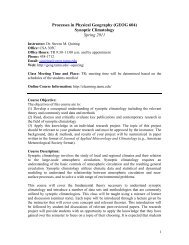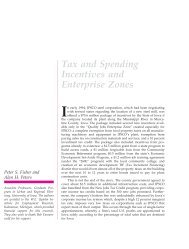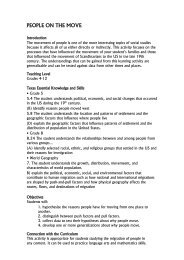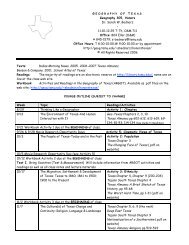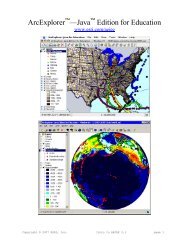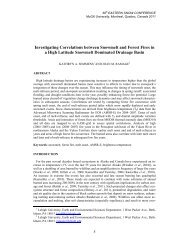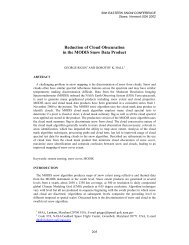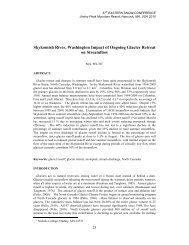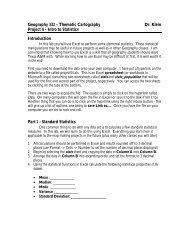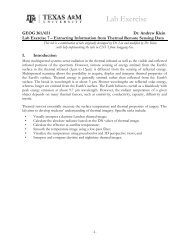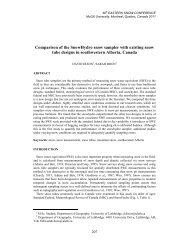Texas Social Studies Framework - Department of Geography ...
Texas Social Studies Framework - Department of Geography ...
Texas Social Studies Framework - Department of Geography ...
You also want an ePaper? Increase the reach of your titles
YUMPU automatically turns print PDFs into web optimized ePapers that Google loves.
7<br />
Pr<strong>of</strong>essional Development<br />
in <strong>Social</strong> <strong>Studies</strong><br />
The National Council for <strong>Social</strong> <strong>Studies</strong> (NCSS) supports<br />
pr<strong>of</strong>essional development as a critical component <strong>of</strong><br />
developing and maintaining social studies programs. A<br />
section <strong>of</strong> the NCSS publication, Curriculum Standards<br />
for <strong>Social</strong> <strong>Studies</strong> (1994), states that: “powerful social<br />
studies teaching and learning are likely to become more<br />
common to the extent that teachers benefit from effective<br />
pre-service preparation and in-service pr<strong>of</strong>essional<br />
development programs, and social studies education<br />
receives support from school administrators, parents, and<br />
local community, and government agencies” (NCSS,<br />
1994, pp. 172-175).<br />
THE STANDARDS FOR STAFF DEVELOPMENT<br />
AND PROFESSIONAL DEVELOPMENT IN<br />
SOCIAL STUDIES<br />
The National Staff Development Council in cooperation<br />
with the National Association <strong>of</strong> Secondary School<br />
Principals developed the Standards for Staff Development<br />
in 1995. The standards are organized into three<br />
categories: context, process, and content. Each <strong>of</strong> these<br />
will be discussed as they relate to effective pr<strong>of</strong>essional<br />
development in social studies.<br />
Context refers to the system or culture in which learning<br />
will take place. Implications for context include the<br />
issues <strong>of</strong> continuous improvement, strong leadership,<br />
sufficient funding, adequate time, and innovation. For<br />
social studies teaching and learning, the context reaches<br />
beyond the boundaries <strong>of</strong> a local school district. <strong>Social</strong><br />
studies includes historical and contemporary study <strong>of</strong><br />
governmental structure and workings, geographic issues,<br />
cultural and economic influences, and critical thinking<br />
skills to aid in assimilation <strong>of</strong> knowledge and understanding.<br />
Thus, the entire community becomes a vital<br />
laboratory for conducting learning. It is important for<br />
school districts and communities to work together for<br />
support <strong>of</strong> student learning.<br />
Within the district, administrative personnel create a<br />
positive context for staff development by recognizing the<br />
value <strong>of</strong> social studies as a means <strong>of</strong> preparing students<br />
to become responsible and contributive citizens. Teachers<br />
are supported by being given time to attend training and<br />
to plan ways to utilize new knowledge. Further support is<br />
demonstrated by supplying necessary funds for implementation<br />
<strong>of</strong> new ideas. The level <strong>of</strong> both district and<br />
community support sets the context for staff development<br />
and determines the level <strong>of</strong> quality <strong>of</strong> ongoing learning<br />
for social studies teachers.<br />
Process refers to the “how” <strong>of</strong> staff development and<br />
describes the means <strong>of</strong> obtaining knowledge. Issues here<br />
include development <strong>of</strong> knowledge, skills, and attitudes;<br />
understanding <strong>of</strong> the change process; integration <strong>of</strong><br />
innovation; ongoing evaluation; a variety <strong>of</strong> approaches;<br />
provisions for follow-up; and linkages to student<br />
achievement. <strong>Social</strong> studies teachers are most effective<br />
when they can determine their greatest needs for new<br />
learning and have the support to pursue their goals.<br />
• The first step in the staff development process is<br />
to prioritize needs. For most social studies<br />
teachers, perceived needs include gaining more<br />
knowledge <strong>of</strong> content and skills, implementing<br />
new curriculum designs, and meeting individual<br />
needs <strong>of</strong> students.<br />
• The next step is to select an appropriate model <strong>of</strong><br />
staff development (discussed later in this<br />
chapter). Utilizing several models might be<br />
necessary to accomplish a certain learning goal.



